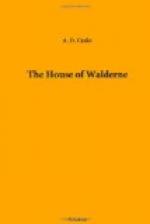7
His literary
acquirements, unusual in the time, increased
his influence
and reputation. Knight’s Pictorial History.
8
How did
I weep in Thy Hymns and Canticles, touched to the
quick by
the voices of Thy sweet-attuned Church, the voices
flowed into
my ears and the truth distilled into my heart.
Saint Augustine’s
Confessions volume 9 page 6.
9
Afterwards
the site of the battle of Edgehill.
10
See his
biography in Macmillan’s Sunday Library.
11
Ethelflaed,
Lady or Queen of the Mercians (under her brother
Edward,
son of Alfred), threw up certain huge mounds and
certain
stone castles, to defend her realm and serve as
refuges
in troublous times. One site was Oxford, and it
is
the first
authentic event recorded in the history of the
city—the
foundation of the university by Alfred being
abandoned
by scholars, as an interpolation in Asser, the
king’s
biographer.
12
The Rival
Heirs, or the Third Chronicle of Aescendune.
13
Because
in later times some poor Jews were burnt there.
14
Like those
still seen at Tewkesbury Abbey, of similar
proportions.
15
The date
of the surrender was November 16, 1537. It was
granted
to Thomas Cromwell, February 16, 1538. It was
at
once destroyed
by skilled agents of destruction, and the
materials
sold. Cromwell did not enjoy it long; he perished
at Tower
Hill by the axe, July 28, 1540.
16
The old
hymn for Wednesday morning, according to Sarum use.
I am indebted
to the Hymnary for the translation.
17
The supposed
name of the penitent thief. The author is not
answerable
for the non-elision of the vowel—the name
is
authentic;
it stood on the site of the present Oriel
College.
See preface.
18
See Alfgar
the Dane, chapter 24.
19
It was the
Gospel for the day in Italy—not in England.
20
The Viaticum
was the Last Communion, given in preparation
for death,
as the provision for the way.
21
Such an
arrangement was made in the Egyptian Temple at On;
at one particular
moment on one day in the year, the rays
admitted
through a concealed aperture gilded the shrine, and
the crowd
thought it miraculous.
22
Adapted
from a translation of a chorus in the Agamemnon by
my lamented
friend, the late Reverend Gerard Moultrie.
23
A mere tradition
of the time, not historical.
24
See the
Andredsweald, by the same author.
25
This is
the same spot mentioned in the Andredsweald, chapter
9 part 2,
as a retreat of the English after Senlac.




